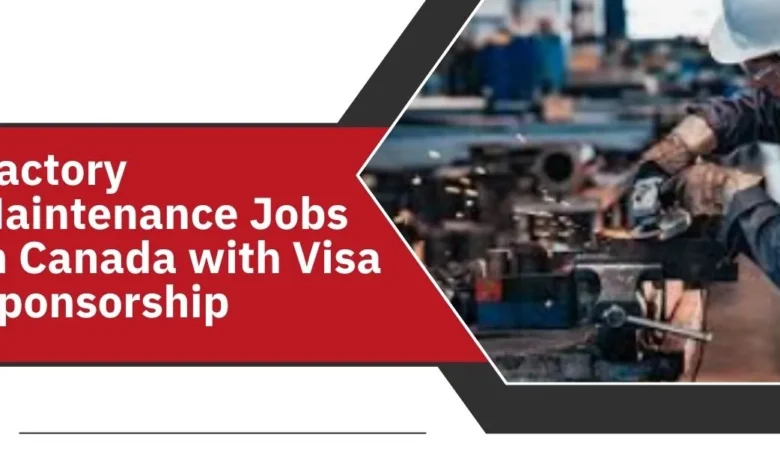Factory Maintenance Jobs in Canada with Visa Sponsorship

Are you a skilled maintenance technician looking for a career that offers stability, great pay, and a life in one of the world’s most desirable countries? Canada’s booming manufacturing sector is facing a critical shortage of talent, and companies are urgently seeking professionals like you to keep their factories running. This high demand isn’t just a job opportunity; it’s a wide-open door to a new future with visa sponsorship and a pathway to Canadian permanent residency.
This guide will show you exactly why these roles are so sought-after. We’ll break down the excellent salary expectations ($55,000 – $85,000+ for experienced technicians), the specific requirements needed to qualify (including certifications and experience), and the life-changing benefits that come with these positions, from comprehensive healthcare to a clear route to citizenship. If you’re ready to leverage your skills for a better life, keep reading to find your path to Canada.
Why Are Factory Maintenance Jobs in Canada in High Demand?
Factory maintenance jobs in Canada are experiencing strong demand due to the expansion of the manufacturing sector, which contributes significantly to the national economy through industries like automotive, aerospace, food processing, and electronics. As production scales up, companies rely on skilled workers to maintain equipment, prevent breakdowns, and ensure operational efficiency, minimizing costly downtime.
An aging workforce is exacerbating the shortage, with many experienced technicians retiring and creating vacancies that domestic workers aren’t filling quickly enough. This labor gap has led employers to turn to international talent via visa sponsorship programs, such as the Temporary Foreign Worker Program (TFWP), making these roles accessible to skilled foreign applicants.
Additionally, Canada’s harsh climate increases wear on machinery, boosting the need for ongoing repairs, while technological advancements in automation require specialized maintenance skills. Overall, these factors position factory maintenance as one of the top in-demand skilled trades, with projections for continued growth through 2025.
What Do Factory Maintenance Jobs in Canada Involve?
Factory maintenance jobs in Canada focus on keeping industrial equipment and production lines running smoothly to support efficient manufacturing operations. These roles are hands-on and essential for safety and productivity. Typical duties include:
- Inspecting and Diagnosing Issues: Regularly checking machinery for faults, using diagnostic tools to identify problems like mechanical failures or electrical issues.
- Routine and Preventive Maintenance: Cleaning, lubricating, adjusting, and calibrating equipment to prevent breakdowns, often following scheduled protocols.
- Repairs and Replacements: Fixing or replacing defective parts, such as motors, belts, or hydraulic systems, to reduce downtime and restore functionality.
- Collaboration and Optimization: Working with engineers, production teams, and technicians to improve processes, install new equipment, and ensure compliance with industry standards.
- Documentation and Safety Compliance: Logging maintenance activities, adhering to health and safety regulations (e.g., OSHA equivalents), and reporting hazards to maintain a safe work environment.
These tasks demand precision and problem-solving, contributing directly to the factory’s output and longevity of assets.
Salary Expectations for Factory Maintenance Jobs in Canada
Factory maintenance jobs in Canada provide competitive compensation, reflecting the skilled nature of the work and the ongoing labor shortage. As of 2024-2025 data, the average hourly wage is around CAD 27, with annual salaries typically ranging from CAD 50,000 to CAD 65,000 for full-time roles, depending on experience, location (higher in provinces like Ontario and Alberta), and specialization. Overtime pay, often at 1.5x the regular rate, and bonuses for on-call work can boost earnings further.
- Entry-Level Maintenance Workers: CAD 25–CAD 28 per hour (around CAD 45,000–CAD 52,000 annually), suitable for those with basic training.
- Experienced Maintenance Workers: CAD 27–CAD 30 per hour (CAD 55,000–CAD 62,000 annually), for those with 4–9 years in industrial settings.
- Specialized Maintenance Technicians (e.g., in electrical or automation): CAD 30–CAD 35+ per hour (CAD 65,000–CAD 85,000+ annually), especially with certifications like Red Seal.
Benefits often include employer-sponsored health insurance, retirement plans (e.g., RRSP contributions), paid vacation (starting at 2 weeks), and sometimes relocation assistance for sponsored workers.
Jobs Requirements for Factory Maintenance in Canada
Securing factory maintenance jobs in Canada, especially with visa sponsorship, requires a blend of technical aptitude, practical experience, and compliance with immigration rules. Employers prioritize candidates who can handle demanding industrial environments. Key requirements include:
- Technical Skills Proficiency in mechanical, electrical, hydraulic, and pneumatic systems, including troubleshooting, welding, and using tools like multimeters or CNC machines. Hands-on experience with industrial equipment is essential.
- Experience in Maintenance At least 1–2 years in factory, manufacturing, or similar settings; entry-level roles may accept related trades experience, but mid-level positions prefer 5+ years.
- Certification and Training Relevant credentials like Red Seal (Industrial Mechanic/Millwright), WHMIS safety training, or trade-specific diplomas (e.g., from colleges like Fanshawe). On-the-job training is common, but certifications boost eligibility for sponsorship.
- Physical Fitness Ability to lift 50+ lbs, stand for extended periods, work in noisy/confined spaces, and handle shift work (including nights/weekends). A medical fitness check may be required.
- Work Visa and Sponsorship Eligibility For foreigners, a job offer from a licensed sponsor is needed for the TFWP or LMIA-approved work permit. English/French proficiency (CLB 5+), a valid passport, and proof of funds (CAD 2,500+) are required. The job must meet the median wage threshold (around CAD 27/hour) for sponsorship.
No formal degree is always needed; practical skills often suffice, but a high school diploma or vocational training helps.
Jobs: Advantages of Factory Maintenance in Canada
For skilled tradespeople worldwide, securing a factory maintenance role in Canada with visa sponsorship offers a powerful combination of professional advancement, financial stability, and a high quality of life. These positions are in high demand, making them a viable and attractive pathway to immigrate.
1. High Demand & Job Security
- Critical Skills Shortage: Canada’s manufacturing and industrial sectors face a significant shortage of skilled maintenance professionals, including Industrial Mechanics (Millwrights), Electricians, and HVAC technicians. This high demand translates into exceptional job security for qualified candidates.
- Economic Backbone: Maintenance workers are essential to keeping factories running smoothly. Their role in preventing costly downtime ensures they are valued assets, not easily dispensable, even during economic fluctuations.
2. Pathway to Permanent Residence
- Express Entry System: Many factory maintenance jobs are classified under skilled trade occupations (National Occupational Classification – NOC TEER 2 or 3), making applicants eligible for immigration programs like the Federal Skilled Trades Program (FSTP) or Provincial Nominee Programs (PNPs).
- Comprehensive Sponsorship: Employers offering visa sponsorship typically support the process for a Work Permit and often continue supporting applications for Permanent Residence, helping you and your family build a long-term future in Canada.
3. Competitive Salary and Benefits
- Excellent Earnings: Factory maintenance roles are well-compensated due to their technical nature and high demand. Salaries vary by province and specialization but often range from $55,000 to $85,000 CAD per year for journeypersons, with potential for higher earnings with overtime.
- Comprehensive Benefits Packages: These positions typically come with benefits rarely offered in other fields, including:
- Extended health, dental, and vision insurance.
- Strong company pension plans or RRSP matching programs.
- Significant paid vacation and sick leave.
- Overtime pay, shift premiums (for night/weekend shifts), and performance bonuses.
- Opportunities for paid overtime can substantially increase annual income.
4. Career Development and Growth
- Skills Advancement: Canadian factories often use advanced machinery and automation technologies. Working in this environment allows you to upgrade your skills and stay at the forefront of your trade.
- Clear Certification Pathways: Canada has a well-established Red Seal Program for many maintenance trades. Achieving a Red Seal endorsement is a nationally recognized standard of excellence that enhances your credentials and mobility across the country.
- Career Progression: There are clear paths for advancement, from apprentice to journeyperson, lead hand, supervisor, and ultimately into management or specialized technical roles.
5. High Standard of Living
- Work-Life Balance: Canadian labor laws strongly protect workers’ rights, ensuring reasonable working hours, mandatory breaks, and paid time off.
- Public Healthcare: As a permanent resident, you and your family will have access to Canada’s universal public healthcare system.
- Safety and Stability: Canada is known for its political stability, safety, and multicultural society, offering an excellent environment to raise a family.
- Natural Beauty and Recreation: Canada boasts incredible natural landscapes, from mountains and forests to lakes and coastlines, providing endless opportunities for outdoor activities.
Visa Requirements
Securing a factory maintenance job in Canada with visa sponsorship is typically done through the Temporary Foreign Worker Program (TFWP) or, for a more permanent solution, pathways that lead to Permanent Residence. The process is employer-driven, meaning a job offer from a Canadian employer is the essential first step.
The primary visa you will apply for is a closed work permit, tied to your specific employer.
1. The Employer’s Requirement: The Labour Market Impact Assessment (LMIA)
Before they can hire you, a Canadian employer must prove that no Canadian citizen or permanent resident is available to fill the job. This is done by obtaining a positive Labour Market Impact Assessment (LMIA) from Employment and Social Development Canada (ESDC).
- The Process: The employer must advertise the job nationally for at least four weeks meeting strict requirements. If no suitable Canadian applicant is found, they can apply for an LMIA.
- What a Positive LMIA Means: A positive LMIA is a document that proves the need for a foreign worker. It is not the work permit itself but is required for you to apply for one.
- Your Role: You do not apply for the LMIA. The employer does. However, you must provide them with documents (e.g., resume, qualifications) to support their application.
2. Your Core Eligibility Requirements
To qualify for the work permit, you must meet the following criteria:
A. A Valid Job Offer from a Canadian Employer
- The offer must be for full-time, non-seasonal work.
- The employer must have a positive LMIA (unless exempt).
B. Proof of Qualifications and Experience
- Work Experience: You must demonstrate you have the necessary experience for the job, typically through reference letters from previous employers.
- Education/Training: While formal degrees are not always mandatory for skilled trades, you must prove you have the training and knowledge. Certificates of apprenticeship or vocational training are crucial.
- Trade Certification (Crucial): Factory maintenance jobs often require a provincial trade certification (e.g., as a Millwright, Electrician, HVAC technician).
- This is a critical step. You must research the specific requirements for your trade in the province where you will work. You may need to have your foreign credentials assessed and may be required to take exams to become certified or to work under supervision until you are certified.
- The Red Seal Program is a nationally recognized standard for many of these trades.
C. Language Proficiency
- You must be able to communicate effectively to perform your job safely. While not always formally tested for the work permit, strong English or French skills are essential for passing trade certification exams and integrating into the workplace. Immigration officers must be convinced you can communicate.
D. Proof of Financial Support
- You must prove you have enough money to support yourself and your family members when you first arrive in Canada (e.g., to pay for rent, food, transportation) until you receive your first paychecks.
E. Medical Exam and Police Clearance
- You may be required to undergo a medical examination to prove you are in good health.
- You will need to provide a police clearance certificate from any country you have lived in for more than six months to prove you have no criminal record.
How to Apply for Factory Maintenance Jobs in Canada with Visa Sponsorship
Applying for factory maintenance jobs in Canada with visa sponsorship involves targeted job hunting and immigration compliance. Focus on employers in high-demand provinces like Ontario, Quebec, and Alberta. Here’s a step-by-step guide:
- Search for Jobs on Portals. Use sites like Indeed.ca, Job Bank (government-run), Glassdoor, and Workopolis. Filter for “visa sponsorship” or “LMIA approved” listings from companies like Magna International, Bombardier, or Linamar. Aim for roles explicitly offering sponsorship to avoid ineligible applications.
- Target Manufacturing Companies Visit the career pages of major firms (e.g., General Motors, Suncor) and apply directly. Highlight your skills in cover letters, as many sponsors are looking for skilled trades due to shortages.
- Engage Recruitment Agencies Partner with agencies like Randstad Canada, Hays, or Adecco, which specialize in industrial placements and handle LMIA processes for international candidates. They can match you with sponsors and assist with interviews.
- Tailor Your Application Materials Customize your resume/CV to emphasize technical skills, certifications, and quantifiable achievements (e.g., “Reduced downtime by 20% through preventive maintenance”). Include a motivation letter explaining your fit and willingness to relocate. Prepare for virtual interviews focusing on problem-solving scenarios.
- Handle Visa Application Once offered a job, the employer applies for an LMIA (proving no Canadian can fill the role), then you apply for a work permit via IRCC (online at canada.ca). Submit documents like passport, job offer letter, qualifications proof, police certificate, and medical exam. Processing takes 8–12 weeks; fees are around CAD 155 + biometrics. Sponsorship often leads to pathways for permanent residency via Express Entry after 1–2 years.



